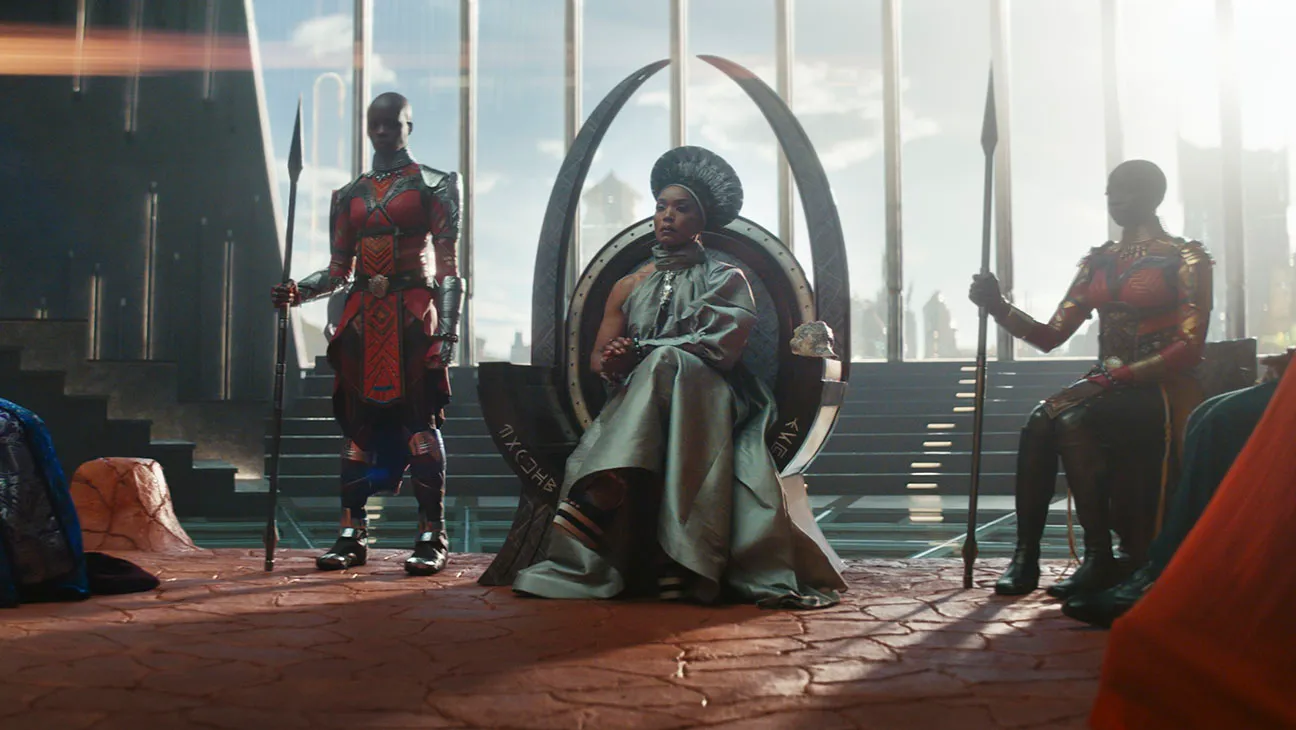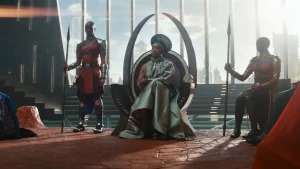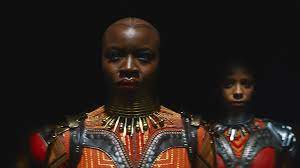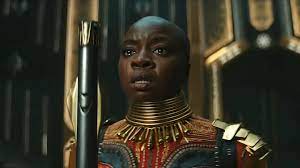🎬 Black Panther: Wakanda Forever (2022)

Review of Black Panther: Wakanda Forever (2022)
The Marvel Cinematic Universe (MCU) takes an emotional and thrilling turn in Black Panther: Wakanda Forever, a film that serves as both a tribute to the late Chadwick Boseman and a continuation of Wakanda’s epic narrative. Directed by Ryan Coogler, this highly anticipated sequel is a powerful exploration of grief, resilience, and legacy, delivering an experience that resonates deeply with fans and newcomers alike.
A Story Rooted in Loss and Renewal
Black Panther: Wakanda Forever begins in a state of mourning, as the fictional kingdom of Wakanda reels from the loss of its king, T’Challa. The film’s opening moments are a heartfelt homage to Boseman, whose untimely death in 2020 left a void both in the MCU and in the hearts of millions of fans worldwide. Coogler’s decision to weave this real-life tragedy into the film’s narrative adds an unparalleled layer of authenticity and emotion.
The plot centers around Shuri (Letitia Wright), T’Challa’s tech-savvy sister, who struggles to find her place in a world without her brother. As Wakanda faces external threats and internal challenges, Shuri steps into the spotlight, navigating her grief while taking on new responsibilities. Her journey is intertwined with Queen Ramonda’s (Angela Bassett) powerful presence as a ruler determined to protect her nation at all costs.
The Rise of Namor: A Compelling Antagonist
One of the film’s standout elements is the introduction of Namor (Tenoch Huerta), the enigmatic leader of Talokan, an underwater civilization inspired by Mesoamerican culture. Namor’s motivations are deeply layered, making him one of the most compelling antagonists in the MCU. His conflict with Wakanda is born from a shared history of colonial exploitation and a desire to protect his people at any cost.
Huerta’s portrayal of Namor is mesmerizing, balancing charisma and menace with ease. The underwater kingdom of Talokan is brought to life with breathtaking visuals, showcasing Marvel’s commitment to world-building. The parallels between Talokan and Wakanda—both advanced civilizations hidden from the world—add depth to the narrative, highlighting themes of cultural preservation and mutual respect.
Stellar Performances Across the Board
The cast of Black Panther: Wakanda Forever delivers some of the most memorable performances in the MCU to date. Letitia Wright shines as Shuri, bringing vulnerability and strength to her character’s evolution. Angela Bassett commands the screen with a performance that is nothing short of award-worthy, portraying Queen Ramonda’s grief and determination with raw intensity.
Danai Gurira returns as Okoye, the fierce leader of the Dora Milaje, and Lupita Nyong’o reprises her role as Nakia, offering a grounded and empathetic perspective to the story. Winston Duke’s M’Baku provides moments of levity while contributing significantly to Wakanda’s leadership dynamics. Together, the ensemble cast creates a rich tapestry of characters, each adding their unique voice to the film’s narrative.
Visual and Technical Mastery
Visually, Wakanda Forever is a masterpiece. The film’s production design and costume work, led by Oscar-winning designer Ruth E. Carter, are nothing short of spectacular. Wakanda’s vibrant landscapes and Talokan’s underwater realms are depicted with stunning detail, immersing viewers in the story’s settings.
The action sequences are meticulously choreographed, blending traditional combat with advanced technology. Ludwig Göransson’s score elevates the film’s emotional beats, seamlessly blending African and Mesoamerican musical influences to reflect the cultural identities of Wakanda and Talokan.
Themes That Resonate
At its core, Black Panther: Wakanda Forever is a story about legacy. The film grapples with the question of what it means to honor those who have passed while forging a path forward. Shuri’s journey embodies this struggle, as she learns to embrace her brother’s ideals while defining her own role as a leader.
The film also explores the complexities of power and responsibility, as Wakanda faces pressure from other nations eager to exploit its resources. These themes feel particularly relevant in today’s world, adding a layer of socio-political commentary to the story.
A Tribute to Chadwick Boseman
Perhaps the most poignant aspect of Wakanda Forever is its tribute to Chadwick Boseman. The film handles his absence with grace, using silence and imagery to honor his legacy. T’Challa’s presence is felt throughout the narrative, serving as a guiding force for the characters and a reminder of Boseman’s impact on the world.
Coogler’s direction ensures that the film never feels exploitative, instead celebrating Boseman’s life and contributions. The result is a heartfelt and respectful homage that will leave audiences deeply moved.
Box Office and Cultural Impact
Black Panther: Wakanda Forever has not only achieved commercial success but has also solidified its place as a cultural milestone. The film’s diverse representation and exploration of underrepresented histories continue to break barriers in Hollywood. Its impact extends beyond the screen, inspiring conversations about identity, heritage, and unity.
Conclusion: A Cinematic Triumph
Black Panther: Wakanda Forever is more than just a superhero movie; it is a cinematic experience that combines action, emotion, and cultural significance. Ryan Coogler and his team have crafted a sequel that honors its predecessor while carving out its own legacy. With stunning visuals, powerful performances, and a story that resonates on multiple levels, this film stands as a testament to the enduring power of storytelling.
Whether you’re a long-time Marvel fan or a casual moviegoer, Wakanda Forever offers something for everyone. It is a film that will make you laugh, cry, and reflect on the importance of legacy and resilience. As the credits roll, one thing is certain: Wakanda’s story is far from over.











